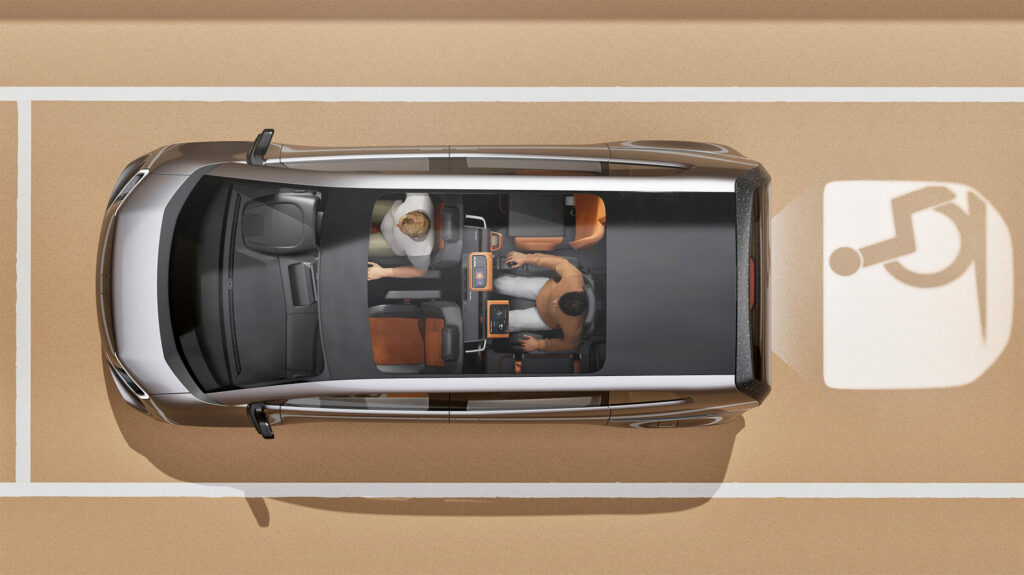In an innovative leap towards making the future of electric vehicles (EVs) more accessible, Motability Operations has unveiled eVITA, an electric wheelchair accessible vehicle (eWAV) concept, in collaboration with Callum, a specialist design and engineering firm. This move is poised to bridge a significant gap in the automotive market, ensuring that over 34,000 wheelchair users across the UK are not left behind in the transition to electric mobility. The unveiling took place in London and Warwick, UK, on 20th March 2024.
The creation of eVITA stems from a focused initiative to integrate inclusive design principles from the outset, involving feedback from Motability Scheme customers, particularly those who use wheelchair accessible vehicles (WAVs). The concern at the heart of this development is that the transition to electric vehicles poses specific challenges for WAV users, primarily due to the space occupied by the floor-mounted batteries in many EVs, which reduces interior cabin space and limits payload capacity.
Addressing these challenges, eVITA showcases a reengineered EV battery layout that not only facilitates wheelchair access but also optimises seating positions and enhances visibility for all passengers. The vehicle features an innovative tailgate design incorporating an automated ramp, tailored to meet the key access requirements of Motability Scheme customers. Additionally, eVITA's interior design offers flexibility, with adaptable seating and storage solutions to cater to the diverse needs of its occupants.
With the automotive industry at a pivotal point of transformation, Motability Operations, which supports 750,000 customers in the UK, emphasises the critical need for inclusivity in the design and manufacture of electric vehicles. The organisation currently oversees more than 34,000 WAVs on the road, receiving approximately 4,000 applications annually for small and medium-sized WAVs. The design and engineering of eVITA by Callum, under the guidance of Ian Callum CBE and engineering director Adam Donfrancesco, aim to set a new standard for inclusivity in EV design.
Key to eVITA's design is the strategic positioning of the EV battery, which has been reconfigured to lower its height, allowing for a completely flat floor from the tailgate to the front row of seats. This innovation not only facilitates easier access for wheelchair users but also ensures they can be seated closer to other passengers, enhancing social interaction during travel. The use of lightweight materials compensates for the additional payload requirements, maintaining the vehicle's efficiency.
The eVITA concept is not just about practicality; it also brings an element of style and innovation to the WAV market. The vehicle boasts a bold silhouette and a sleek roofline that accommodates accessibility needs without compromising on aesthetics. With dimensions that seek to offer a more compact footprint than current offerings, eVITA aims to appeal to a broad audience. The vehicle's anticipated 200-mile range on a single charge is powered by a 50kWh battery, making it a competitive option in the growing EV market.
Notably, eVITA features innovative solutions such as LED puddle lights that project the required space for ramp extension onto the ground, alerting other motorists to maintain a clear access area. This thoughtful design element addresses a common frustration among WAV users.
The eVITA project also serves as a platform for nurturing young talent in the automotive industry, with students Zoe Graham and Yikuan Zhang contributing fresh ideas to the concept's development. Their involvement underscores CALLUM's commitment to fostering the next generation of designers and engineers.
As the automotive industry continues to evolve, eVITA represents a critical step towards inclusivity, ensuring that the benefits of electric mobility are accessible to all. Through this project, Motability Operations and Callum are not only demonstrating what is possible with forward-thinking design and engineering but also setting a precedent for the industry to follow. The collaboration calls for a unified effort among manufacturers, designers, engineers, and policymakers to embrace inclusive design principles, ensuring that the transition to electric vehicles is equitable and accessible to everyone, including those with mobility challenges.
To find out more about Motability and how they might be able to help you, click here.
